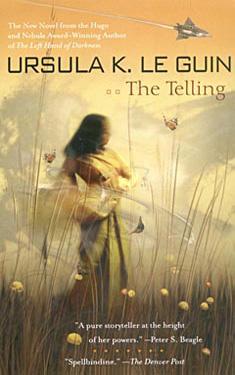Ursula K. Le
Guin
Completed 12/15/2018,
Reviewed 12/15/2018
3 stars
“The Telling”
is the last book Le Guin wrote in the Hainish cycle, a group of eight books
that share a common universe, but can be read separately and as standalones. The few terms that may be unfamiliar, like Ekumen
and ansible, can be found on the internet easily, so you don’t really need any
background from the other books. Despite
my love of Le Guin, I didn’t enjoy this book that much. It’s soft science fiction in the classic
sense, that is, more anthropological than the hard science. Normally, this is where Le Guin shines, but I
found the world she built to be not that interesting. She says a lot of interesting things about
books and religion and theocratic oppression.
However, it simply didn’t grab me as much as I would have thought these
topics would have.
 As usual,
there isn’t much plot. Sutty is from India
in the distant future. She’s chosen to
go to the planet Aka as an observer from the Ekumen, a confederation of planets
of which Hain is the originating world.
When she arrives, she finds that the culture she has been sent to study
has been usurped by a corporation government that is trying to raise the level
of technology to match the alien visitors.
Rather than absorb the new technologies and sciences, the corporation
has chosen to outlaw and purge the old culture, including books, religion, and
people. After finding almost nothing in
the big city on Aka, Sutty gets to go to small village where the last vestiges
of the culture are still alive. However,
she is closely watched by the Monitor, a corporate agent who is also looking to
rout out the remnants of the old ways.
As usual,
there isn’t much plot. Sutty is from India
in the distant future. She’s chosen to
go to the planet Aka as an observer from the Ekumen, a confederation of planets
of which Hain is the originating world.
When she arrives, she finds that the culture she has been sent to study
has been usurped by a corporation government that is trying to raise the level
of technology to match the alien visitors.
Rather than absorb the new technologies and sciences, the corporation
has chosen to outlaw and purge the old culture, including books, religion, and
people. After finding almost nothing in
the big city on Aka, Sutty gets to go to small village where the last vestiges
of the culture are still alive. However,
she is closely watched by the Monitor, a corporate agent who is also looking to
rout out the remnants of the old ways.
My biggest
problem with the book was that nearly nothing happened. While this isn’t unusual for a Le Guin novel,
I found it problematic here. In the
place of the action, there’s a lot of research of the old culture. Sutty spends a lot of time trying to figure
out the old religion. Specifically, she realizes
that it’s not really a religion at all, but a way of being and remembering and
sharing stories. That’s all well and good,
and normally, I would really embrace that.
However, I found it to be very meandering to the point of being confusing. Sure, Sutty is confused as she studies the
religion and traditions and stories, but the way it was written, I felt like Le
Guin never really had a firm grip on it either.
She wrote all around it, giving Sutty and us a sense, but never a good
solid grip on the culture. On the other
hand, this non-religion which Sutty calls The Telling does not fall into the
trappings of religion that we have here on Earth, like forced duality, fear of
the other, and bigotry.
I found the
prose to be not nearly as beautiful as I found it in Le Guin’s other books. It was at times muddled, especially in trying
to relate Sutty’s research. I found the
readability to be tough.
On the
positive side, Sutty is an interesting character. She’s a lesbian, which I think is a first for
Le Guin. Her sexuality is not in the
forefront, but it creates a well-rounded background for Sutty, and conflict
with the rightist corporate regime on Aka.
The Earth itself is also an interesting character. It parallels to the experience of Aka, with an
oppressive world theocracy that also destroys books and culture.
I give the
book three stars out of five. It’s a
decent book, but probably one of the weakest books by Le Guin I’ve read. It has a lot of interesting concepts and great
moments, but it’s bogged down by muddled prose and less than stellar execution. My next Le Guin read will be her earliest
Hainish book, written over thirty years before this one. It will be interesting to contrast the style
of an earlier work with her later style, which I’ve read a lot of lately.
No comments:
Post a Comment